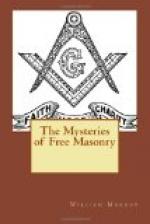Union is that kind of friendship that ought to appear conspicuous in the conduct of every Mason. It is so closely allied to the divine attribute, truth, that he who enjoys the one, is seldom destitute of the other. Should interest, honor, prejudice, or human depravity ever influence you to violate any part of the sacred trust we now repose in you, let these two important words, at the earliest insinuation, teach you to put on the check-line of truth, which will infallibly direct you to pursue that straight and narrow path which ends in the full enjoyment of the Grand Lodge above, where we shall all meet as Masons and members of one family; where all discord on account of religion, politics, or private opinion, shall be unknown and banished from within our walls.
Q. What followed? A. The Worshipful Master in the East made a demand of me of something of a metallic kind, which, he said, was not so much on account of its intrinsic value, as that it might be deposited in the archives of the Lodge as a memorial that I had herein been made a Mason.
Q. How did the Worshipful Master then dispose of you? A. He ordered me to be conducted out of the Lodge and invested of what I had been divested, and return for further instruction.
Q. After you returned, how was you disposed of? A. I was conducted to the northeast corner of the Lodge, and there caused to stand upright like a man, my feet forming a square, and received a solemn injunction, ever to walk and act uprightly before God and man, and in addition thereto received too following charge. [For this charge see pages 10-12.]
* * * * *
SECOND SECTION.
Question—Why was you divested of all metals when you was made a Mason? Answer—Because Masonry regards no man on account of his worldly wealth or honors; it is therefore the internal, and not the external qualifications that recommend a man to Masons.
Q. A second reason? A. There was neither the sound of an axe, hammer, or any other metal tool heard at the building of King Solomon’s Temple.
Q. How could so stupendous a fabric be erected without the sound of axe, hammer, or any other metal tool? A. All the stones were hewed, squared, and numbered in the quarries where they were raised, all the timbers felled and prepared in the forests of Lebanon, and carried down to Joppa on floats, and taken from thence up to Jerusalem and set up with wooden mauls, prepared for that purpose; which, when completed, every part thereof fitted with that exact nicety, that it had more the resemblance of the handy workmanship of the Supreme Architect of the Universe than of human hands.
Q. Why was you neither naked nor clothed? A. As I was an object of distress at that time, it was to remind me, if ever I saw a friend, more especially a brother, in a like distressed situation, that I should contribute as liberally to his relief as his situation required, and my abilities would admit, without material injury to myself or family.




